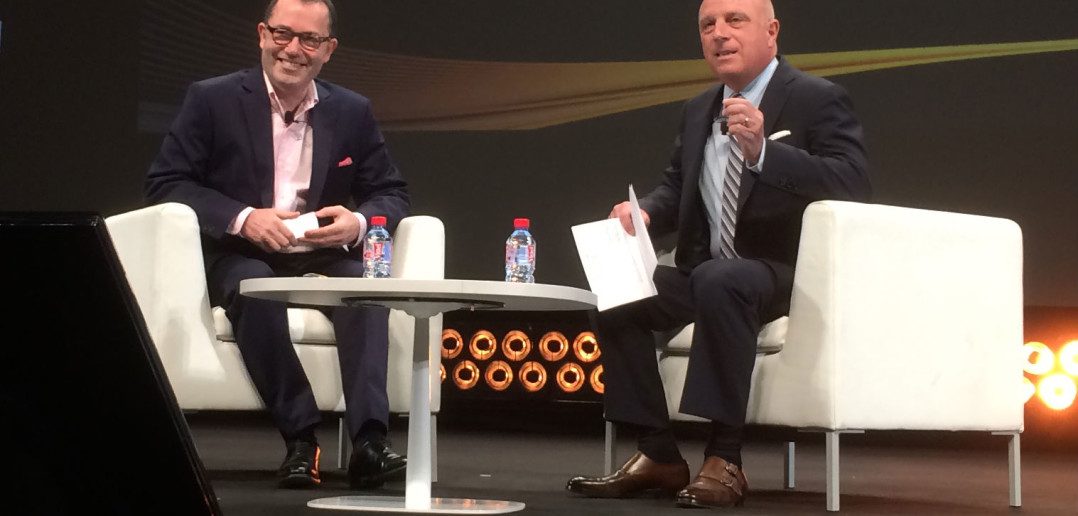Starz is one of the companies that likes to make a splash at MIPTV with new productions, and also views on the TV industry’s direction. CEO Chris Albrecht took to the stage for a keynote session this morning, reflecting on the opportunities and challenges for original programming in a conversation with Playground CEO Colin Callender.
That conversation started with co-productions, with Callender reminiscing about coming to MIPs three decades ago. « It wasn’t a conversation about creativity, it was a conversation about trust. It was a conversation about two co-producers trusting or not trusting that each was on the same side, » he said. « As I look at the market now, although things have changed, the challenges of co-productions have remained: it’s about trust and relationships. »
Albrecht talked about Rome, a co-production between HBO, the BBC and RAI in Italy when he was working at HBO. « The show worked great in the US, it worked well in the UK, and the Italians hated it! It comes down to trust and some familiarity in a process. I think the mini-series area is one that is a little bit easier and unique, because you’re not trying to repeat it. But in a world where people are looking for these big, long-running series, trust and process become keys to success. »
He suggested that the American showrunner-style model is unique, and is starting to be adopted by other countries. But Callender suggested that there are differences in these showrunners. « The showrunner is a writer-producer in the series business. Certainly in television in England, and I think this is true of most European markets, the producer is not necessarily a writer, but it is the producer who is responsible for delivering the show to the network, as opposed to the showrunner. But they’re very different people, and I think there is a tension between those two models… where it’s not clear who’s in charge of delivering the vision. »
He talked about White Queen, which was a big success for Starz in America, and « not quite as big a success » for the BBC in the UK. « This was an example of an entirely British show which you guys at Starz bought into, and it was an enormously bigger success in the States than here, » he said. « What’s right at the heart of it is who is executing the show? Is it the network, is it the studio, is it the producer, is it the showrunner?… That’s where the tension starts to arise, and why there’s a need for someone in the middle. »
Albrecht suggested that traditionally, the studio putting up the most money would have the biggest say, but with Starz, it doesn’t have the same « pile of cash » that the big networks have: so it has to find its way into material and shows even if it’s not having the final say. White Queen was a recent example of this: « We said okay, we just have final consultation. BBC: final say on the scripts, final say on the casting, final say on the budget. What we did in the beginning was we agreed on parameters. »
Albrecht came back to trusting the creatives behind a show, rather than trying to meddle too much. « What is probably true in co-productions is the same thing that’s true if you’re fully financing something for your own network: you’ve got to find a good idea, you have to have someone who you believe in who has a vision and can execute on that vision. Then you have to make sure they have the resources necessary to fulfil their vision, which you as either the sole, primary or even a minority partner are buying in on… Networks shouldn’t produce television series. Producers should produce television series. So it’s important for us to lay back and allow that process to happen. »
Callender warned that the process can sometimes get in the way of realising these visions, citing casting in particular, including « the tension between getting a star and getting the best actor for the role ». He also pointed to the tension of different buyers’ expectations, citing a show called Dracula. « NBC wanted a show for a Friday night at 10 o’clock as part of a horror fantasy slot, and Sky wanted a show to launch Sky Vision, which was appealing to women, » he said. « NBC would be pulling in one direction, Sky in others… The process can get in the way. »
Albrecht said it all comes back to a central vision agreed upon at the beginning, a trusted executor of the vision, and then trust from the various partners to « lean back » and understand that there is time to get their voice heard in the process, without getting in the way.
The pair talked about why shows like The Killing have worked, referring back to their shared history at HBO. « What we partly did at HBO was focus on character, focus on ideas and characters, » said Callender. « Oddly the success of shows like The Killing: It was a character-based show. It was a thriller, but really it was about character, that was what distinguished it. »
Albrecht and Callender also talked about the difficulties some shows have when remade for a new market, particularly the US. Callendar explained why Upstairs Downstairs wouldn’t have worked in the US: « In the UK, the people living downstairs believe they should be living downstairs. In America, the people living downstairs believe they should be living upstairs! »
Albrecht remembered being brought UK show Queer As Folk when he was at HBO. « I thought ‘why would I try to remake this? This is already really good!' » he said, noting that one of his concerns when being brought a show for possible remaking is « Can I do better than that? What would be unfortunate, and I think you see it happen in format shows, not so much in unscripted, but in scripted shows, the project that is created off of the format doesn’t in some way have that same essence that the original programme had. »
Watch video clips from this and other MIPTV conferences here; full videos on our YouTube channel 2-3 hours after each session ends.




